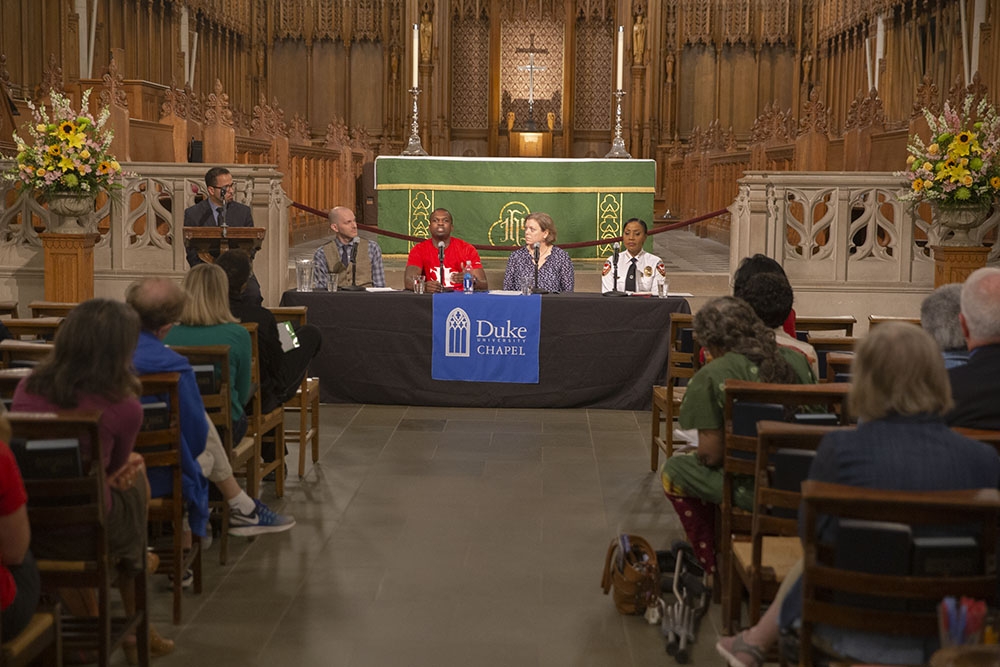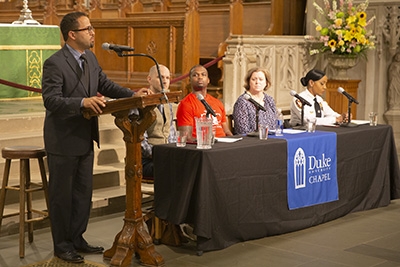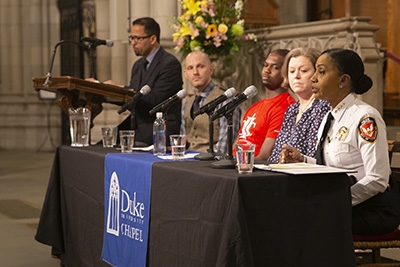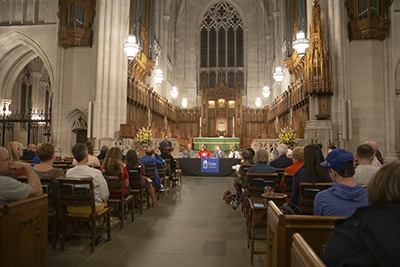Discussion Highlights Gun Violence Suffering, Causes, and Deterrence

Academic, law enforcement, and community leaders shared insights, frustrations, and hopes about preventing gun violence, as part of a public conversation Tuesday night (October 15) at Duke Chapel.
Chapel Dean Luke A. Powery moderated the discussion, Every Life Sacred: the Urgency to End Gun Violence, before an audience of fifty people with more than fifty people additionally watching the livestream of the event.
(Watch the WRAL News coverage of the event. Read the (Duke) Chronicle article about the event.)
| Watch the Bridge Panel conversation here or listen on Apple Podcasts. |
In introducing the event Powery said, “In relation to this topic, I stand here as a person who grew up in Miami, Florida, and have family members whose lives have been taken by gun violence, and whose lives have been threatened by gun violence.
“In many ways this conversation tonight is not just a theological one or a sociological one but it is personal for many of us,” he said.
Durham Police Chief Cerelyn “CJ” Davis cited a number of measures her department has taken to deter gun violence, including educating people on securing guns they own, training police on de-escalation tactics, and cultivating relationships in communities with high rates of violence.
IMG_9554_web400.jpg

“I’ve been doing this thirty years, and we cannot arrest crime away,” she said.
“To me this really boils down to decades of talking about the same thing…,” Davis said. “And when you really listen to the community—and the voice of the community—the community is saying over-and-over again, … ‘Nobody is going to get serious about this until it happens in their community.’”
Dr. Kristin Goss, Kevin D. Gorter Professor of Public Policy and Political Science at Duke, said that some interventions have shown incremental success in reducing gun violence, including universal background checks on people purchasing guns, tightening domestic violence laws, and better enforcing existing gun laws.
IMG_9568_web400.jpg

“Right now there are certain categories of people who, if you are in that category you are not allowed to have a gun, and those categories are pretty blunt,” she said. “They are missing a lot of people who shouldn’t have a firearm and they are including a lot of people who would probably be perfectly safe in owning a firearm.”
Rob Belcher founded a Durham community group Chance2Change that works with residents to build community, create a visibly peaceful presence in the streets, and share information on gun violence prevention.
“I see a city that’s only concerned about what’s going on in their bubble…,” Belcher said. “We have to step outside of our bubbles, step outside of our houses, come outside of our churches, come together as a city.
IMG_9559_web400.jpg

The Rev. Ben Haas is the executive director of the Religious Coalition for a Nonviolent Durham, which holds vigils for people who are murdered and helps men and women transition out of prison.
“When we find in our heart to declare unacceptable what has already happened, we are speaking to what we will allow in the future,” Haas said. “The way that we create a culture of care around the suffering that violence has wrought in this community is precisely the same conversation we have about … how we will prevent violence in our community.”
The discussion was part of the Chapel’s Bridge Panels series, which seeks to connect people from disparate walks of life in order to discover shared pathways toward the beloved community of God.